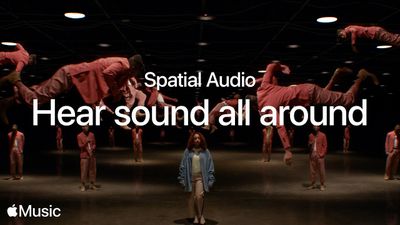In an interview with Billboard, Apple's vice president of Apple Music and Beats, Oliver Schusser, details the growth of and reaction to Spatial Audio and Lossless Audio on the streaming platform.

Apple Music gained Spatial Audio and Lossless support in June 2021, and since, Apple has continued to add new songs to its catalog that support both new features. Apple had previously promised that its entire catalog of 75 million songs would be made available in Lossless, and according to Schusser, the company has fulfilled its promise.
Schusser said that while the entire catalog of Apple Music songs supports the higher-quality format, the limitations of Bluetooth and the inability for headphones, such as AirPods, to play back the audio continues to be a challenge.
"Everyone in the industry was really focused on Lossless," says Schusser. "We have every song in our catalog available in Lossless to us delivered by the industry, but the challenge is it doesn't play on any headphone in the world over Bluetooth or any wireless connection, and that is by a country mile the number one way how people consume music these days."
Apple Music subscribers can listen to Lossless using the built-in speakers on their iPhone, iPad, Mac, and HomePod. Still, though, Schusser admitted that Lossless remains a niche feature that most average listeners won't notice but that Apple still wanted to move ahead in bringing it to the masses.
Schusser says most people can't tell the difference when Lossless music is played and noted that while it's an important feature to a select niche, it isn't a mass-market product. "And so," he says, "we went out and said we would like to have a feature for the mass market that works on pretty much every device and where people notice a difference."
Discussing Spatial Audio, which provides listeners with an immersive listening experience, Schusser says that compared to when the feature launched last summer, Apple Music's offering of Spatial Audio content has grown exceptionally. Schusser says that more than 50% of Apple Music subscribers are now listening in Spatial Audio.
Apple Music only had a few thousand songs available in Spatial Audio when it launched the feature last year, and the company went on a journey to sell artists and producers — along with listeners — on the new immersive experience.
"We now have more than half of our worldwide Apple Music subscriber base listening in spatial audio and that number is actually growing really, really fast," says Schusser. "We would like the numbers to be higher, but they are definitely exceeding our expectations."
While Apple continues to add new songs to its database that support Spatial Audio in partnerships with studios, the company is still focusing on ensuring the quality of the mixing on those songs.
For Apple's part, the company is emphasizing the importance of quality mixing here — compared to the early days of Dolby Atmos Music, when some mixes didn't live up to the quality of the original recordings. "We listen to every song that comes in Spatial Audio to us and we try to engage with people who make the cut during the process," Schusser says.
Spatial Audio is not only allowing listeners to enjoy new music in a more immersive way, but it's also re-engaging fans with older songs, according to Rachel Newman, Apple Music's global head of editorial and content.
"We're seeing huge uptick in artists' back catalog off the basis of them re-engaging their fans with a new way of listening to the music," says Rachel Newman, Apple Music's global head of editorial and content. Streams of Spatial Audio tracks on Apple Music editorial playlists have grown by 125% since the feature launched last summer, Newman notes.
In a previous interview made in December, another Apple Music executive echoed similar remarks made by Schusser regarding the limitations of Bluetooth and Lossless audio.
Apple would like "more bandwidth" than what Bluetooth can provide, said Apple's vice president of acoustics, Gary Geaves. "I'll stop right there. We would like more bandwidth," Geaves added.
Apple is very possibly working on addressing the limitations of Bluetooth by creating a new wireless protocol, and the company's next-generation high-end AirPods Pro expected to launch this year could be the first AirPods to support playback of Lossless Audio.























